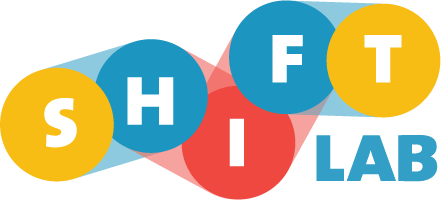ABOUT SHIFT LAB 1.0
Shift Lab 1.0 was based in amiskwaciwâskahikan on Treaty 6 territory, traditional meeting grounds for the Cree, Saulteaux, Blackfoot, Dene, Nakota Sioux, Iroquois, Métis, and Inuit.
Over 2 years (2015-2017) diverse community teams explored ways to reduce racism at systemic and everyday levels. What was unique in our city was utilizing a social innovation process to co-create, prototype and test anti-racism interventions.
In Shift Lab 1.0, core team community members decided to work on racism in the housing system. In 2021 the prototype Diversity Certified continues to be developed by Shift Lab 1.0 core team members and a non-profit.
Shift Lab 1.0 and 2.0 started from a 5 year partnership between Edmonton Community Foundation and Skills Society Action Lab .
In 2015, addressing racism and discrimination continued to be identified as a critical piece of the puzzle in how to reach the big goal of ending poverty in a generation in Edmonton. Building on the work of many local initiatives, the diverse collective making up Shift Lab 1.0, stewarded an exploration to develop potential service, policy, system and community action prototypes that aimed at helping reduce racism as it contributes to poverty. We wanted to be bold and explore how to Shift ideas. Shift attitudes. Shift systems and Shift into new ways of solution finding with community.

“Aboriginal people, immigrants and refugees experience discrimination in workplaces, housing, services and facilities that exclude them from opportunities and put them at risk of poverty.”
EndPovertyEdmonton Strategy 2015
WHY THE INTERSECTION OF RACISM AND POVERTY?
According to Edmonton Social Planning Council 2015 research, one out of every eight people living in Edmonton (100,870) lives in poverty. That means 12% of Edmontonians do not have the means to assure stable housing, adequate nutritious food, or the conditions that foster health, safety and basic quality of life. In alignment with feedback from Aboriginal leaders and many community members through EndPovertyEdmonton’s work, the Edmonton Shift Lab also considers poverty to be more than just an economic issue. Poverty of inclusion, belonging, and opportunities are also key pieces.
“The Cree word for poverty is Okitimakisiw which loosely translated into English means a person in need, or one who lives poorly. Cree people recognize you can be monetarily rich but poor without a circle of true friends or values to guide you.”
ROOT CAUSES OF POVERTY
SOURCES OF VULNERABILITY
CALGARY POVERTY REDUCTION INITIATIVE, 2013
Racism affects many living in poverty. Racist beliefs, attitudes, and behaviours violate fundamental principles of human rights relating to respect, equality, and dignity for all. Confronting and eliminating racism is a critical part of ensuring that everyone can fully engage and participate in our community.
ENDPOVERTYEDMONTON STRATEGY 2015

GUIDING PRINCIPLES OF SHIFT LAB 1.0
Some principles guide and underlie the approach of the Edmonton Shift Lab. These core principles are reminders to help the collective understand the mindset and conditions that lay the foundation for success. As the lab evolves new principles will emerge and be incorporated over time.
WE FOSTER A SAFE EXPERIMENTAL SPACE
This work is complex and often messy. In the Edmonton Shift Lab we choose to create a fun, open, and inclusive environment where we strive to be aware of our biases and bold with our ideas. We believe the opportunity to come together in a space that values making mistakes along the way builds trust and infuses learning, laughter, friendship and community building into the process.
WE CREATE SOLUTIONS WITH COMMUNITY
Working in complexity is tricky. We believe the wisdom generated from the coming together of a diverse collective helps us get to more thoughtful solutions. Together, we build opportunities to learn from others, co-design with community, and test our solutions with people to ensure that they actually work.
WE EMBRACE NEW WAYS OF THINKING AND ACTING
To get to better solutions we need new patterns of thinking and acting. Through Human-Centered Design Thinking and Processes to explore root causes of a complex issue we are opening up new ways of collaborative solution finding. Our exploration integrates creative problem solving practices with rigorous methodologies to help us carve new ways forward while navigating complexity.
WE FOCUS ON IMPACT
Getting to solutions that work for the people we serve is at the core of the Shift Lab. By working with people, using a creative process, and testing what we come up with, we believe we can discover some potential solutions to the messy, complex, and tricky problem of racism and its intersection with poverty.
“A social innovation can be a product or new service but it can also be a principle, an idea, a piece of legislation, a social movement, an intervention, or some combination of them.”
SHIFT LAB 1.0 PROCESS
In Shift Lab 1.0, the shift started with people – it was about working with community to co-design solutions. This meant working in a very different way by using human- centred design approaches with a dash of systems thinking to work through this complex challenge. Design Thinking begins with empathy, is action oriented and helps people move from talking about ideas to making them tangible and testable. Systems Thinking helps people identify possible root causes of complex issues by looking at the different parts of a system, the spaces in-between those parts, and how those parts work together as a whole.
“I was thrilled to hear that the Edmonton Shift Lab would be exploring the intersection of racism and poverty. Thinking back on my time as co-chair of the community well-being working group of EndPovertyEdmonton I can recall many discussions that focused on the impact of systemic racism on well-being and consequently on poverty. It is of utmost importance to recognize, explore, and ultimately address how it is that oppression and racism factor into the complex issue of poverty. I look forward to seeing how the Shift Lab uses social innovation and collaborative human-centered design approaches to tackle this challenging issue.”
ROBIN MAZUMDER- CO-CHAIR COMMUNITY WELL-BEING WORKING GROUP OF ENDPOVERTYEDMONTON
SHIFT LAB 1.0 PHASES

OK, THIS ALL LOOKS NICE, BUT WHAT WAS SHIFT LAB 1.0 REALLY TRYING TO DO?
HERE’S THE THING: RACISM IS
UNFORTUNATELY STILL AROUND.
Discrimination towards Indigenous people, refugees and newcomers to Canada is especially a problem. Racism makes it hard for people to find good jobs, good housing, helpful services and feel a sense of belonging in community-Racism is preventing people from getting out of poverty. Our collective wanted to make progress on these complex challenges by co-creating solutions together.
The Edmonton Shift Lab didn’t want to just talk about these issues with community. The Edmonton Shift Lab also didn’t have all the answers. The Shift Lab wanted to bring lots of diverse people together to create solutions that address racism and poverty. Proposed solutions might have been a new service that helps people in community, or it might have been a community project or a new policy. As we created ideas together we wanted to try them out and to see if they work for people. The aim was as we found stuff that worked, we wanted to find ways to make the good ideas grow and spread. In Shift Lab 1.0 we had lots of help from leaders in many systems to help make positive change happen.


IN ALL THE EFFORTS TO REDUCE POVERTY WE’VE COME ACROSS, RACISM IS CONSISTENTLY IDENTIFIED AS ONE OF THE SYSTEMIC BARRIERS AND ROOT CAUSES KEEPING MARGINALIZED PEOPLE IN POVERTY.
EndPovertyEdmonton identified 6 “game-changers” that need to be addressed in order to get to the root causes of poverty; eliminating racism was on that list. This is not a new realization: in its 2001 Durban Declaration, the United Nations noted the inextricable link between poverty and racism. Systemic barriers to education, employment, affordable housing, and social inclusion as well as on-going impacts of colonization and immigration policy mean that Aboriginal people and newcomers disproportionately experience poverty, which in turn can support racist attitudes and policy, which contributes to further poverty. There is no simple solution to this complex problem but the Edmonton Shift Lab hopes to find some pathways forward.










